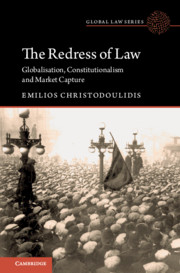Book contents
- Reviews
- The Redress of Law
- Global Law Series
- The Redress of Law
- Copyright page
- Dedication
- Contents
- Acknowledgements
- Introduction
- Part I Political Phenomenology
- Part II Political Constitutionalism
- 2.1 Constituent Power and the Constitutional Distinction
- 2.2 Constitutionality
- 2.3 Labour, Solidarity and the Social Constitution
- 2.4 Constitutionalism Adrift
- Part III Market Constitutionalism
- Part IV Strategies of Redress
- Epilogue
- References
- Index
2.1 - Constituent Power and the Constitutional Distinction
from Part II - Political Constitutionalism
Published online by Cambridge University Press: 26 March 2021
- Reviews
- The Redress of Law
- Global Law Series
- The Redress of Law
- Copyright page
- Dedication
- Contents
- Acknowledgements
- Introduction
- Part I Political Phenomenology
- Part II Political Constitutionalism
- 2.1 Constituent Power and the Constitutional Distinction
- 2.2 Constitutionality
- 2.3 Labour, Solidarity and the Social Constitution
- 2.4 Constitutionalism Adrift
- Part III Market Constitutionalism
- Part IV Strategies of Redress
- Epilogue
- References
- Index
Summary
If ‘to speak of constituent power is to speak of democracy’, as Antonio Negri puts it in the opening sentence of his important early work Insurgencies, the question that constituent power invites from the outset is how are we to think democracy democratically? But how are we to make sense of this double inscription of the ‘democratic’ at both first- and second-order levels? It imports a seemingly paralysing unsettledness, a double contingency of sorts, in the offer of choice over choice, of reflection over reflection. And yet its allure and its promise are evident, at least to a radical tradition of constitutional theory that typically returned to the promise of constituent power to face up to the following question: If a political society or collective is that which acts through rules of ascription, to what extent can that ascription remain reconfigurable, reflexive, alive to re-definition, open both to operationalisation and transcendence by the collective that it names? This is of course also the problématique of Marxism, of a certain Marxism that counts Negri amongst its exponents, which self-consciously places the subject of emancipation in media res, both bound historically to the modalities of an ascription that could not be stepped behind within an order of capital that defined subject positions, while at the same time holding on to the promise of an overcoming, and of a genuine reflexive process of self-definition.
- Type
- Chapter
- Information
- The Redress of LawGlobalisation, Constitutionalism and Market Capture, pp. 151 - 192Publisher: Cambridge University PressPrint publication year: 2021



